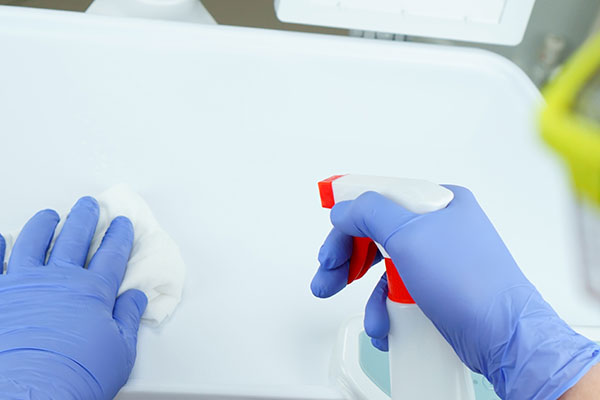Common Dental Infection Control Procedures to Protect You During COVID-19

According to the Centers for Disease Control and Prevention (CDC), COVID-19 is believed to spread mostly between people in close proximity, which means dental offices need to ramp up their infection control procedures to protect their patients. Dental procedures involving dental tools (including hand tools and ultrasonic scalers) and air-water syringes produce a spray that may contain contaminated aerosols and droplets.
Common dental infection control procedures
For those who have emergency dental issues, are not symptomatic for COVID-19 and have no history of potential exposure to COVID-19, the dentist will adhere to proper PPE and infection control protocols to protect the patient from contracting the disease. Common dental infection control procedures include the following.
Patient evaluation
Foremost, dental professionals need to identify suspected cases of coronavirus disease. Normally, a patient with coronavirus in the acute febrile stage should not visit the dental office. In this care, the dentist will identify the patient and not treat the patient in the dental office but instead, promptly quarantine the patient and report to the infection control department as soon as possible.
When patients come into the dental office, their body temperature will be measured. They will also have to answer questions about their medical history, travel history and potential contact with someone who might have had coronavirus. If the patient fits into a high-risk profile after the initial evaluation, they will be advised to self-isolate for 14 days and report any feverish feeling or flu-like symptoms to the local health department.
Hand hygiene
There are reports about fecal-oral transmission for COVID-19, which makes hand hygiene important in a dental office. Dental professionals must reiterate the importance of good hand hygiene. More specifically, dentists will wash their hands before examining the patient, before a dental procedure, after touching the patient, after touching unsterilized surfaces and equipment and after touching damaged skin or wounds, body fluid, blood, oral mucosa, secretion and excreta. Dental professionals will also be cautious and avoid touching their eyes, nose or mouth.
Rubber dam isolation
Using rubber dams can greatly reduce the production of saliva- or blood-contaminated aerosol or spatter, especially in procedures when high-speed hand tools and ultrasonic devices are needed. When using a rubber dam, additional high-volume suction for spattering and aerosol will be used during the treatment, as well as regular suction. In some cases, if rubber dam isolation is not possible, the dentist will use manual devices such as hand scalers for decay removal and periodontal scaling to reduce the production of aerosol as much as possible.
Disinfection and sterilization
Dental offices are taking extra measures to ensure effective disinfection of the office area. Cleaning and sterilization are done in accordance with CDC guidelines. Public areas and devices will be cleaned frequently and disinfected, including door handles, chairs and desks. Every reusable instrument will be pre-treated, cleaned, sterilized and stored properly.
In conclusion
Dental offices will continue to observe best practices regarding infection control to keep patients safe throughout the COVID-19 pandemic. If you have a dental emergency, contact the dentist as soon as possible for more information.
Request an appointment here: https://artisandentalbellevue.com or call Artisan Dental at (425) 454-2005 for an appointment in our Bellevue office.
Check out what others are saying about our services on Google: Read our Google reviews.
Related Posts
Getting a smile makeover means getting at least one type of cosmetic dental treatment. You may want to improve your smile, but along with these treatments is the benefit of better oral health. Finding out more about this makeover can help you make informed decisions. Here are the details to consider about a smile makeover.The…
A smile makeover can be achieved with the help of one procedure or several. What a dentist recommends depends on the attributes of your smile you would like to change. To give you a better picture of some treatments that can transform a smile, take a look at these five popular treatments.Slight to moderate misalignments…
Considering a smile makeover and not sure where to start? Read on to learn more. Many people avoid smiling due to dental imperfections. A smile makeover may be the answer. A dentist can improve your smile with cosmetic procedures like teeth whitening, bonding, and veneers. The right professional for the treatment is the key to…
A smile makeover treatment can target dental stains and discoloration. Some of them affect the surface, while others penetrate the deeper layers of the mouth. A full evaluation can determine the right procedure to correct this cosmetic dental issue. Here are the common smile makeover options you should consider for your discolored or stained teeth.Despite…









